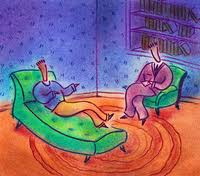Discovering Authority Issues with Heart-Centered Hypnotherapy
Discovering Authority Issues with Heart-Centered Hypnotherapy
 Authority issues in the therapeutic relationship: Transference and Countertransference
Authority issues in the therapeutic relationship: Transference and Countertransference
Surprise, surprise! Therapists are human just like their clients, often with very similar issues. This is why Freud, Jung and others brought to our awareness the concepts of transference and countertransference. They became aware of experiencing authority conflicts and power struggles with their own patients as well as with each other, their colleagues. From our 35+ years of teaching and healing professional therapists, we have also become aware of how pervasive unresolved authority issues are within all of us, therapist as well as patients. Do you find yourself reacting (being triggered) when a client engages in a power struggle with you? Perhaps they disagree with your advice, miss an appointment, or don’t keep an agreement they made with you. An extreme form of this is a client who reports you to your professional Board or takes a legal case against you. The way to notice a trigger is to check in with your body. When a client is late (or any of the above mentioned triggers), drop into your chest or stomach and see if there is a tightness, shortness of breath or discomfort. Notice your jaw; is their clenching or tightness?
It is difficult to properly treat clients who trigger us by reacting to our authority in subtle or not so subtle ways. This is why our predecessors (Freud, Jung, etc.) always required their students to be in their own analysis/therapy for many years so that they could resolve their own issues and be unbiased with clients. In Heart-Centered Hypnotherapy we completely agree and follow the model of, “Physician, heal thyself.” We often say, “You can’t take a client anywhere you haven’t been yourself.” If we, as therapists, continue to be in our own self-discovery process, we will learn as much from our own reactions to our clients as we learn directly from them.
How do most therapists handle clients who are reactive to them or who trigger their own issues? Some therapists try to ignore it, some actually engage in trying to rescue the client or fix their problems and others just refer “unpleasant” clients to another therapist. These are unhealthy choices and don’t allow us, as therapist or our clients to effectively heal.
How to Discover Authority Issues
Many people find themselves reacting when a person or institution has power and authority over them. People may get triggered (react strongly) when stopped by a policeman, get critiqued by their boss, or are evicted by a landlord. Others may react to political leaders, to their course instructors, or to their minister, rabbi or priest. Do you notice yourself in power struggles (acting out behavior, or even just in your mind) with others who are in positions of authority: criticizing the authority, finding faults with how they govern, teach or run institutions? Perhaps you often feel you know better than others and get into power struggles with officemates, parents, spouses or even your own children.
Authority issues are universal and affect many areas of our lives. It is important to become aware of the clues or triggers to our own authority issues before we, as therapists, can properly treat these issues in our clients. Noticing the triggers or reactions in our bodies can provide us with invaluable information that leads to healing. Authority issues can take the form of feeling powerless in the presence of certain other people, comparing ourselves in our mind and then feeling incompetent or better than, and then engaging in power struggles in relationships. We may notice ourselves “putting others down,” trying to steal power from the authority figures, or engaging in gossip about those who are in authority. Some people do the opposite and try to align themselves with powerful people by bragging about their personal friendships or association with those in authority in order to elevate themselves. Whether discounting authority or falsely aligning with it, these are all road signs pointing to where the healing needs to happen.
Healing Through Heart-Centered Hypnotherapy
In Heart-Centered Hypnotherapy we use the strongest triggers as the starting point in each therapy session. The conscious mind can tell stories, fool the therapist, or believe our own justifications. However, in hypnotherapy we often ask the body to tell us the true story. The body never lies and is a very clear road marker which points in the direction of our own individual issues. Whereas the conscious mind in cognitive therapies can take us on detours, put up road blocks, and make the trip much longer than it needs to be, the subconscious mind provides us with the direct route to the issue we want to heal. This direct route to healing authority issues not only gives us insights into our projections, but allows us to finish our business with people in our lives that we may only subconsciously have known to be unfinished (Fritz Perls). Through age regressions we can express feelings that were unacceptable to express as children, we can change our old unhealthy conclusions about ourselves, and make new functional decisions about how to behave.








